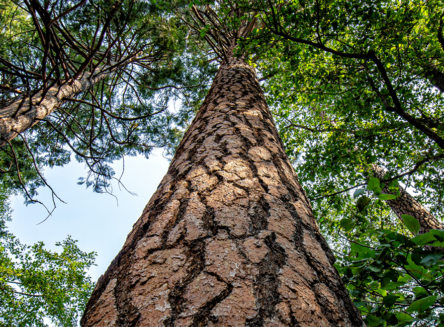
Flathead Valley Community College Students Seeking Publics Help to Document Ponderosa Pine Trees
Ponderosa pine trees in the Bigfork area took a huge hit after a damaging hail storm back in the summer of 2022.
The trees are still suffering from the incident and now, scientists are working alongside students to understand what exactly is happening to these trees.
“We want ponderosa [pine trees] in the Valley. We want to protect what we have,” said FVCC Natural Resource Conservation Management student Becca Johnson.
“It's an important species for our landscape and for our communities. And the majority of our ponderosa pines are just majestic trees. They're large, they're beautiful. And they're a very important part to the ecosystems that they reside in,” explained FVCC Natural Resources/Surveying professor Tim Eichner.
Due to recent weather events, disease and a spike in insect infestation, the ponderosa pine tree population is declining in the Flathead Valley.
“It's super hard to deal with. There's not a lot of answers, and a lot of money is going into it. So I guess getting an understanding on that is going to is the first step in finding a solution, I guess,” said Johnson.
Students at FVCC have been concerned about the health of the ponderosa pine tree population in the Valley and are calling on citizen scientists to help collect data to understand what exactly is going on with the trees.
“So, citizen science is an effort to try to crowdsource data collection. You know, if just depend on scientists to collect data, you're limited in terms of how much data you can collect," Eichner explained. "And you're also very limited in what areas you can access. So generally speaking, if you turn a bunch of citizens loose on it, they're passionate about it to begin with and they'll collect data that you otherwise can't actually collect yourself."
Students taught a group of volunteer citizen scientists how to identify ponderosa pines, the Western Pine beetle and how to identify affected diseased trees on Wednesday, Oct. 18, 2023.
They will take the info collected by citizens, upload it to an app the students created, to log the health of the ponderosas.
“I'm looking forward to contributing to the citizen science effort. I think it's citizen's responsibility to get out there and help their community, and this is an exciting way to do it because then we get to be out in the forest and looking at trees,” said volunteer Melissa Jenkins.
Working alongside the Flathead Lake Biological Station, FVCC students hope this project will help them understand pine decline and individual tree and forest characteristics that may influence resiliency that may help save the ponderosa pines.
“With all the data that everyone is helping us collect, it's gonna be super beneficial to helping the Ponderosa in the valley and get a grip on what's going on and understanding,” said Johnson.
Anyone can help map ponderosa pines in the Flathead area. You can scan the QR code at the top of this article to begin mapping ponderosa pine trees.
Visit this website for more information on how to complete the mapping.
Click here to learn more about how the ponderosa pine decline in the Flathead Valley began.